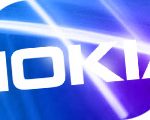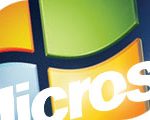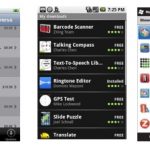The Android Market is a churn machine

MocoNews yesterday got some critical information from T-Mobile USA about Google's Android Market, the most interesting of which is the average G1 user's voracious consumption of Apps.
According to the report, 40 million apps have been downloaded since the G1 debuted just over five months ago, and based upon the number of handsets sold, the average user downloads 40 apps from the Android Market.
Killer Instinct: Samsung unveils sequel to popular touchphone

Samsung's Instinct was not only Sprint's fastest selling EV-DO handset, but it also ranked as Best Buy's best selling handset since 2006. And though Samsung followed it up with the Windows Mobile "TouchWiz"-equipped Omnia, the splash made by the Instinct was too big to avoid a sequel.
At CTIA Wireless in Las Vegas, Sprint and Samsung announced the Instinct s30 will be available on April 19 through Sprint's stores and Web site for $129.99 with a two-year contract and applicable rebates.
After a 12-year downhill slide, SGI is no more

The former Silicon Graphics, Inc., which has officially gone by the name SGI for several years, will sell its entire assets to Rackable Systems, the low-power data center server producer, for a mere $25 million, according to an SEC filing this morning.
Of the many heroes that graced the landscape of microcomputing during its formative years, few were more outspoken and more endearing -- in that particular way that entrepreneurs can be -- than the once high-profile CEO of SGI, Ed McCracken. Throughout the 1980s, McCracken championed the ideal of producing an original architecture for graphics workstations, at a price that (hopefully) folks could afford. At a time when there were big conferences every month and keynote speakers were everywhere, McCracken was one of the biggest, speaking not only about technology but about leadership strategy and executive conduct.
Nokia debuts its own 'augmented reality' app

At CTIA Wireless '09 this morning, Nokia unveiled Point & Find, a service currently in beta that uses a phone's camera to identify objects and present relevant information on screen.
Point and Find combines real-time image processing and recognition technology with the phone's data connection and GPS location to link the camera's real-life images to related digital content and services. Barcode scanning has also been integrated.
The cost of SMS will soon go higher, but by how much?

At the CTIA Wireless show in Las Vegas today, the Mobile Entertainment Forum (MEF) will unveil survey results around the financial impact of a proposed hike in fees for text messaging services in the US.
Although the costs might ultimately be passed on to consumers, the tariffs will start to be imposed this spring by mobile carriers. Those affected will include content publishers, service providers, and aggregators.
Microsoft to offer bare-bones Windows Server 2008 through OEMs

Despite the rapid growth of networking in the home, recent studies have informed Microsoft that a vast multitude of single-office businesses -- on the "far left" side of the SMB scale -- still work with either single PCs for their principal applications, or peer-to-peer networked clients. The company's research has drawn the conclusion that this market may be best served by an "all-in-one solution" -- one where business users simply buy the server and have it plugged in for them, and they don't even install the operating system.
For this reason, there's no fancy plastic box for the newest SKU for Microsoft's server OS announced this morning, called Windows Server 2008 Foundation. Instead, this very-basic rendition will come pre-installed on OEM and partner systems, the first of which are likely to premiere this month. Look for likely brand names such as HP, Dell, IBM, and Acer to top the list of manufacturers offering new, simple half-tower units at lower prices.
So far, no surprises as Conficker switches to new system

In a way, you might say that this is where the real trouble with Conficker starts: As of 4am EDT -- or 10:30pm in the Marquesas Islands, where the day begins -- the malware appears to be doing exactly as predicted, switching to its powerful newer algorithm. As experts also predicted, no serious amount of amok has been run and the Net has not experienced a massive meltdown.
Today, anyway. As we wade through the much-anticipated April 1 update, it's almost certain that the real damage comes later. Smooth sailing today beats mayhem, of course, but whatever Conficker's botnet is designed to do, it's apt to do it in the days and weeks to come -- well after flightier members of the public (and their media outlets) will have concluded that Conficker's danger passed on April 1. They'll assume that they're safe... and they're apt to regard malware and its ilk as a less serious, pervasive, and insidious problem than computer professionals understand it to be.
Latest Postini spam stats show the post-McColo calm is over

Google's Postini service regrets to inform us that after just over four months, the spam drop we saw in the wake of November's McColo takedown has been erased by a new, smarter breed of spam technology. The company released an overview of the relevant numbers in a blog post Tuesday morning.
Postini, which handles spam-blocking services for over 15 million business users across 50,000 companies, has been watching traffic climb back from the McColo drop since it happened, at one point estimating that spam traffic would return to normal in February. And the first one-day traffic spikes did indeed start to equal previous numbers right around then. But last week was the first time the service has seen those levels sustained over seven full days. In addition, the rate of increase is remarkable, with spam traffic growing by 1.2% each day during the first quarter of the year.
EU consumer commissioner calls for user profile security standards

In a speech on the eve of an important Consumers' Summit to take place in Brussels, European Commissioner for Consumer Affairs Meglena Kuneva told a roundtable convened to discuss data security policy that personally identifiable data (PID) -- the stuff advocacy groups fear could end up in the wrong hands -- may not be the biggest privacy problem Internet users face. As long as Web services maintain profiles of their users, even without associating those profiles with names or addresses, the misuse or misappropriation of that data, Comm. Kuneva said, may still endanger Internet users.
"No one in the digital space really cares about our actual names or exact physical addresses. What traders want is a description of who we are and a way to reach us," Kuneva told the roundtable (PDF of speech transcript available here). "They want to know that the person behind the number 1234 is young, sporty, drives fast cars and travels frequently and that as a trader you can show up on his screen at your convenience. This is fine. But what about the person behind number 456, unemployed, in debt and about to lose his home? He is a target for predatory loans and fraudulent financial and yes, personal, advice."
Mobile marketplace could make Windows Mobile 6.5 worthwhile

Even though the interface is practically indistinguishable from that of the Android Market, details revealed today by Microsoft about the Windows Mobile Marketplace adds promise to Windows Mobile 6.5, an OS version that many have already written off as a placeholder until WM7.
When Windows Mobile Marketplace goes live, it will be populated with software from companies such as EA, Netflix, Pandora, Facebook, Sling Media, Gameloft, AccuWeather.com, and at least half a dozen others. Many of the apps will be ports of apps already proven popular on the iPhone, and Microsoft said it expects many more developers of the nearly 20,000 Windows Mobile developers to list apps.
Twitter makes design change, no Facebook-style tantrums ensue

Mark Zuckerberg, take note: Twitter on Monday quietly introduced a high-visibility change in design and functionality, and no one's crying or threatening to leave the service. "Today's update better reflects how folks are using Twitter now," writes founder Biz Stone in his blog.
The change turns "Replies" on the service into "Mentions," and groups them under a tab on the left labeled with the familiar @username syntax -- for instance, for the Betanews Twitter account, Mentions displays as @BetaNews. And where previously the Replies tab showed only those tweets that began with the flag, Mentions shows every instance in any message. (In other words, it now sees "La la la @BetaNews" as well as "@BetaNews la la la.") The adjustment will help Twitter users to keep track of any conversation in which they're flagged. And as with the original @username reply flag, the new usage was developed and perpetrated by the users, rather than dictated by a design team.
Sun clouds over as another 1,500 workers are let go

As announced back in November and discussed during their most recent earnings call, Sun's effort to reduce their workforce by 15-18% continues this week with layoffs for 1500 employees. It is believed that most of the positions are sales jobs and other "customer-facing" staff.
The layoffs, which overall are expected to affect 5,000-6,000 staffers, will cost the company $375-$450 million, after which they're expected to save Sun between $700 million and $800 million annually. The company's next earnings call will take place on April 28; their Q3 '09 ends today.
Wikia Search finds its way to the bitbucket

The contributions counter on the front page ticks slowly, slowly along, but it would be faster to watch the minutes count down for Wikia Search, Jimmy Wales' "people powered" would-be Google competitor, which announced Tuesday that it was shutting down at day's end.
The Wikipedia founder wrote in his blog that the project "has not been enjoying the kind of success that we had hoped." Wikia Search, known early in its career as Wikiasari, was launched in January 2008, and rolled out its Wikia Intelligent Search Engine for developers in October.
YouTube wins out in the race against Hulu for ABC content

In a move which may have forestalled a deal that may have accelerated arch-rival Hulu's "evil plot" to assimilate consumers' brains, YouTube has made an extended deal with Disney Media Networks -- parent company of the American ABC and ESPN channels -- that not only gives ABC its own branded YouTube channel, but enables Disney to manage its own in-stream advertising.
This afternoon, a hastily-produced preview video was posted to ABC's new channel in a format that could not be embedded elsewhere, contrary to the usual YouTube methodology. And a two-and-a-half minute clip from a recent SportsCenter serves as a placeholder for future content on ESPN's new YouTube channel. ESPN already has a full-featured sports news and video highlight service on Disney's own Go Network, its homebase since 2004 after Disney and Microsoft's MSN terminated their deal.
Broadcom looks to replace HDMI with Ethernet

Wireless streaming of high-definition video must still be very far off.
While it does exist in various forms today, one of the premier members of the Wireless HD Consortium, Broadcom, is proposing a new streaming video interface standard which focuses on HD over Ethernet.
© 1998-2024 BetaNews, Inc. All Rights Reserved. Privacy Policy - Cookie Policy.




